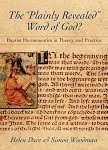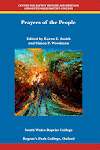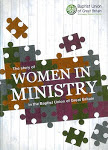I first encountered Paul when visiting various Baptist Colleges to try and decide where to train for Baptist ministry, and I clearly remember the meeting Liz and I had with him in his study at Regents Park College in Oxford, and the encouragement that he gave us. Ultimately I chose Bristol (no offence meant, Paul), but for some years he still seemed to think I had actually studied at Regents!
I have had the privilege on two occasions of publishing essays by Paul in books I've edited, and I have to say he is a joy to work with. His writing is superb, and his essay on Prophecy, Corporate Personality, and Suffering was so meticulously proof read before it arrived that my co-editor (Helen Dare) and I had to look long and hard to find anything at all to justify our editorial claims.
Paul has been an encouragement, inspiration and friend, and I am grateful to God for him.
It is perhaps best to let his own words speak for themselves, so...
On Baptist hermeneutics:
The authority of scripture is its intrinsic power to grasp
and shape human lives; it witnesses to a human experience of God, and this
experience continues in the present through the activity of the Spirit. Wheeler
Robinson suggests that Baptists are committed to this understanding of the
witness of the Spirit in scripture through their commitment to believers’
baptism, which is both an expression of faith and a baptism of the Spirit. This is, we might say, a baptismal hermeneutics.
Our Baptist interpreters are committed to history and the
critical-historical method; they have some confidence in finding the intention
of the writer in his historical context; but they also think that the meaning
of the text is not confined to these aspects. What we now call
‘reader-response’ is essential for the meaning of the text, but this response
includes a movement of faith and obedience. The reader does not just contribute
to the meaning of the text, but is engaged in a search for truth. This aspect
is valid, I suggest, even if we drop the quest for an ‘enduring principle’
within the form, and even if we raise some doubts about how much of an author’s
experience we can uncover. Faced with the text, the reader is challenged to
discern the truth of God…
We may return finally then to the question of hermeneutics,
as discussed earlier, in the light of recent insistence that interpretation can
only be done in community. Out of the
context of their community and their corporate memory Baptist interpreters are
called to make a value-judgement about truth as they read scripture, and the
truth they have often found there is the redemptive suffering of God. They are
called to make their own judgement in faith, and they are able to make it
through the Spirit of God. But they are not imprisoned in memories. If we
follow H. Wheeler Robinson’s perceptions into the activity of the Spirit in all
human consciousness, and the kinship of all humanity with God, this
interpretation will always be open to hear the discoveries of other communities
too.
Fiddes, Paul S. "Prophecy, Corporate Personality, and Suffering: Some Themes and Methods in Baptist Old Testament Scholarship." In The 'Plainly Revealed' Word of God? Baptist Hermeneutics in Theory and Practice, edited by Helen Dare and Simon Woodman, 72-94. Macon, GA: Mercer University Press, 2011, pp. 84-5, 94.
And on the theology of prayer:
In intercession we find that we are being pulled into a zone
of inter-connection. This kind of prayer is supremely social. We are being
swept into a current in which nothing is separated from anything else, no one
from anyone else. We find we are being urged by the Spirit to pray for those
far away in the world, some of whom we have never met; we find that we can
enter with empathy into the experience of the hungry and needy of the world,
and that this opens up an awareness of the hungry and needy parts of ourselves.
We who pray for others find that we too are being prayed for as we enter the
community of prayer…
If divine activity takes the form
of partnership between God and the world, then as we pray we can add the
persuasive power of our love to God’s. That is, in praying for others we are
expressing our love and concern for them, and God takes that desire into the divine
desire for their well-being. God wants to create a response within persons at
every level (conscious and unconscious), to entice them into an openness to new
possibilities that will promote healing, to woo them into cooperating with
initiatives of grace. Our hopes, expectations and longings for someone are
assumed into God’s own persuasion, augmenting and amplifying the urgings of God’s
Spirit, so that together God and the interceders begin to work transformation.
Whether we want someone to act justly and generously, or to be comforted, or to
be strong in the face of adversity, God is the means of communicating this
desire to them, and of making it effective within God’s own pressure of grace
where on their own our wishes could achieve little. At the same time, of
course, the one praying is becoming attuned to the desires of God, prompted to
act appropriately, and where possible, to change the situation with practical
deeds of help…
In intercession, then the two
patterns of dialogue and dance interweave. We respond to the revealing of God’s
purpose (dialogue), and we are drawn into the communion (or dance) in God where
we can affect the lives of others. In making prayers of intercession, it is
appropriate to include some details of the situation for which we are praying,
and not just to be vague, as long as the result is not a set of instructions
(or a ‘shopping-list’) for the way that God should operate. A realistic
understanding of the needs faced by people will help us to empathize with them,
entering imaginatively into their situation, and so enabling us to enter more
deeply into God’s transforming love towards them. Our prayer is also informed
by hope, as we imagine what it would be like for our desires to be fulfilled.
There is a serious playfulness, a festive note as we live in imagination in a
situation that has not yet happened, praying ‘your kingdom come ... as in
heaven, so on earth’.
Fiddes, Paul S. "A Theology of Public Prayer." In Prayers of the People, edited by Karen E. Smith and Simon P. Woodman, 1-16. Oxford: Centre for Baptist History and Heritage and South Wales Baptist College, 2011, pp. 11, 12, 13.














